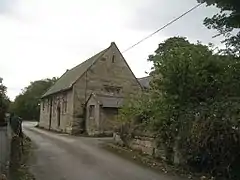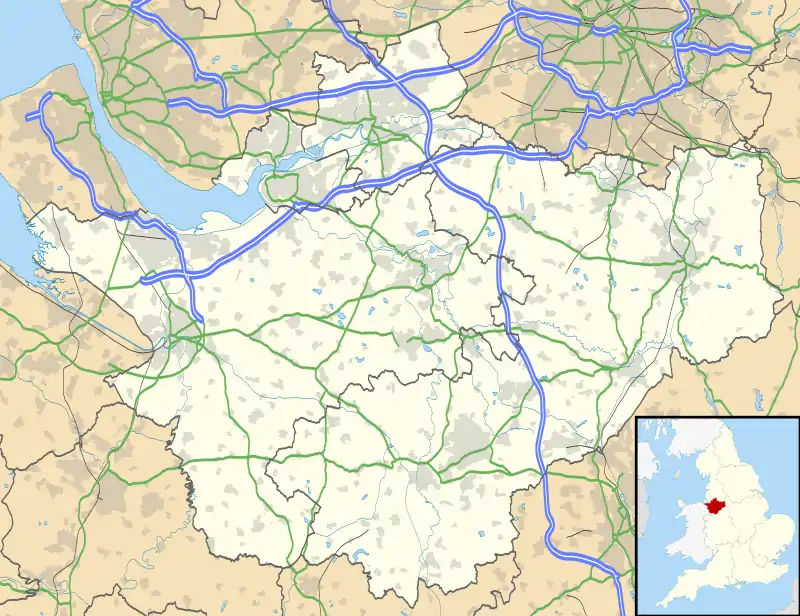Ashton Hayes
Ashton Hayes is a village and former civil parish, now in the parish of Ashton Hayes and Horton-cum-Peel, in the unitary authority of Cheshire West and Chester and ceremonial county of Cheshire, England. It is located about 8 miles east of Chester on the B5393 road. The nearest villages are Mouldsworth to the north east and Kelsall to the south east. According to the 2011 Census it had a population of 936.[1] The main village in the parish – formerly known as Ashton – was renamed Ashton Hayes following a referendum, to avoid confusion with other places of the same name.[2] The civil parish was abolished in 2015 to form Ashton Hayes and Horton-cum-Peel, part of it also went to Mouldsworth.[3]
| Ashton Hayes | |
|---|---|
 The village hall, Ashton Hayes | |
 Ashton Hayes Location within Cheshire | |
| Population | 936 (2011 Census)[1] |
| OS grid reference | SJ511693 |
| Civil parish |
|
| Unitary authority | |
| Ceremonial county | |
| Region | |
| Country | England |
| Sovereign state | United Kingdom |
| Post town | CHESTER |
| Postcode district | CH3 |
| Dialling code | 01829 |
| Police | Cheshire |
| Fire | Cheshire |
| Ambulance | North West |
| UK Parliament | |
Medieval pottery kiln
In 1933 a pottery kiln, which had been in use between the 13th and 15th century, was discovered in the garden of Smithy House. When excavated, it was found to consist of an oval structure with a stoke-hole on the southeast side. It contained thousands of fragments of broken pottery. Some of these have been reconstructed, forming about 30 objects, mainly jugs and pitchers, which are now in the Grosvenor Museum, Chester. The site of the kiln is a scheduled monument.[4][5]
Carbon neutrality
In November 2005, the Ashton Hayes Parish Council agreed that the village should try to become England's first carbon neutral village and launched a programme starting 26 January 2006.[6] The move is supported by the local community, businesses, the local council and The Energy Saving Trust. In July 2006 the total annual output of carbon dioxide from the village was calculated by students from the University of Chester at 4,765.76 tonnes.
With the aid of a DEFRA grant, a film was made explaining the issues and the villagers' efforts, and intended to receive its premier in the village on 25 January 2007.[7] It is hoped that the film will increase awareness and encourage other communities to adopt the concept.[8]
Measures taken to offset or reduce this have included installing house insulation, installing energy saving light bulbs and wind turbines, and a large number of trees have been planted.[9] In the first year of the programme the village reduced its carbon footprint by 20%. In the 10 years since, the figure rose to 40%.[6] The programme has inspired other towns and cities to adopt similar models.[10][11]
See also
References
- 2011 Census: Ashton CP (Ashton Hayes), Office for National Statistics, retrieved 14 September 2014
- Ward, David (6 August 2004), The trouble with Ashton _, London: The Guardian, retrieved 29 January 2007
- "ASHTON HAYES". GENUKI. Retrieved 24 March 2018.
- Historic England, "Monument No. 71295", PastScape, retrieved 11 February 2009
- Revealing Cheshire's Past: Ashton Medieval Kiln, retrieved 11 February 2009
- de Lucia, Carmella (19 January 2016). "Ashton Hayes celebrates 10 years of Carbon Neutral Project". Cheshire Live. Retrieved 27 September 2019.
- Daily News: Green village to premiere 'eco-film', Energy Saving Trust, 5 January 2007, retrieved 29 January 2007
- North West takes on the climate challenge, Department for Environment, Food And Rural Affairs (North West), 5 September 2006, archived from the original on 30 September 2007, retrieved 29 January 2007
- Students study 'green' village, Chester Chronicle, icnetwork.co.uk, 12 May 2006, retrieved 29 January 2007
- "How do you become England's first carbon neutral village?". BBC News. 23 August 2016. Retrieved 27 September 2019.
- Schlossberg, Tatiana (21 August 2016). "English Village Becomes Climate Leader by Quietly Cleaning Up Its Own Patch". New York Times. Retrieved 27 September 2019.
External links
| Wikimedia Commons has media related to Ashton Hayes. |
